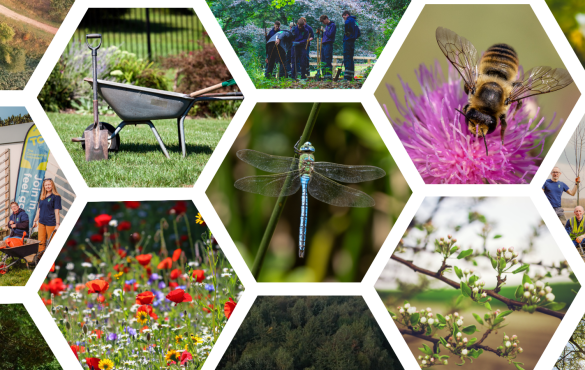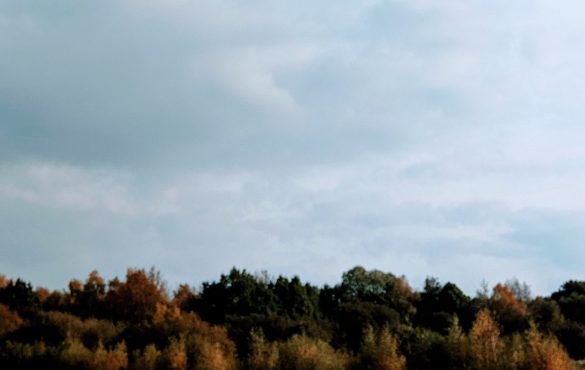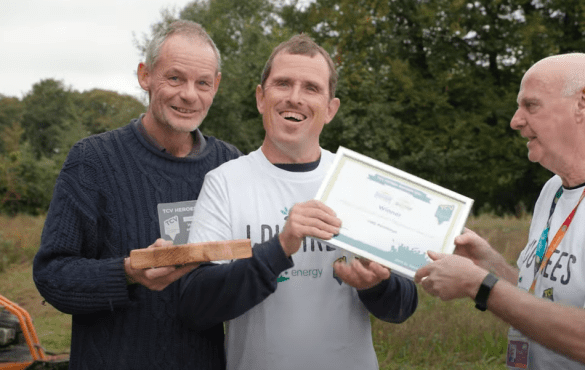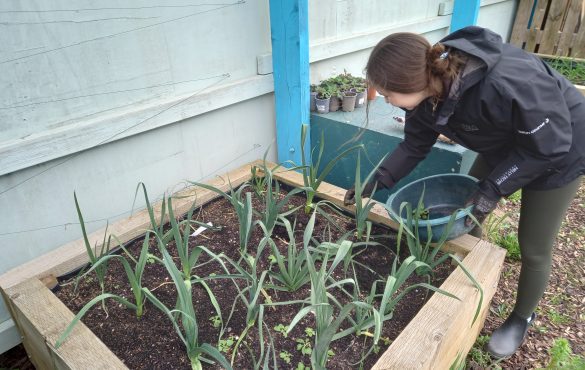TCV’s WildSkills trainees have had a couple of varied months, including tackling seasonal tasks such as meadow management and balsam control (thanks to Eva for a fantastic explanation why this work is important), cooking ‘homegrown’ food from a jetty on the River Thames, and leading groups of school children in fun, educational sessions. Read on to find out more, and to see Kate and Elliot’s TV appearances on BBC’s Countryfile.

Kate Pullen, TCV London
On screen…
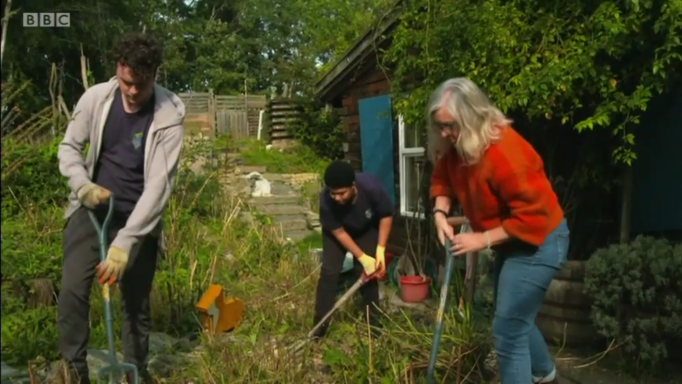
Earlier this month I did some filming for the BBC with Elliott, my fellow trainee. They were reporting on green jobs for Countryfile’s Plant Britain and we were asked about our thoughts and experiences of having a green job in the city. Overall, I enjoyed meeting the presenter and talking to the crew.
Catch the episode here and hear Kate talk about getting into the sector, including barriers and why TCV’s WildSkills traineeship has been so beneficial for them.
…and in the day job
I organised and led a session with partner Mind where we made bird collages with bits of tissue paper, old maps and coloured card. The participants had a lot of fun with it. I also organised and helped lead a spider day at TCV’s Greenwich Peninsula Ecology Park (GPEP). In the morning Warden Tony hosted a spider hunt and in the afternoon me and Project Offcier Jaanki ran a craft session where kids came and made spider mobiles.
Finally, we had a harvest lunch at the Jetty near GPEP. With a volunteer we dug up potatoes, spring onion and New Zealand spinach from the raised beds that we cooked for a delicious lunch – 10/10 would make again!
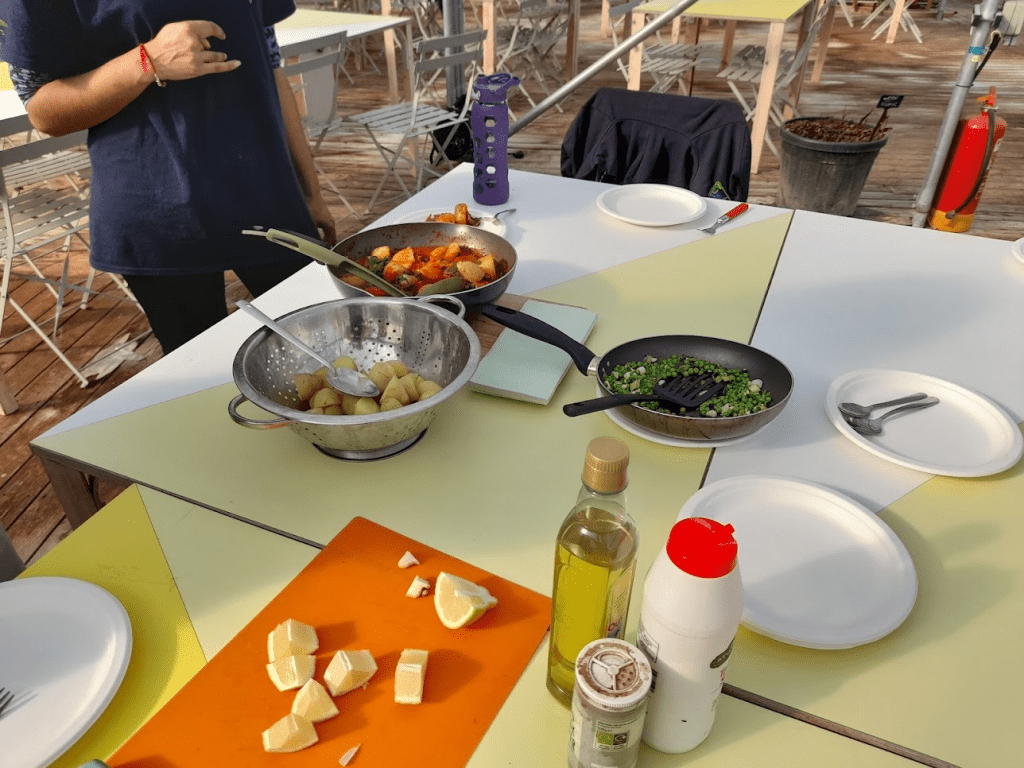
Jozef Szklaruk, TCV London
More about that delicious homegrown food by fellow London trainee, Jozef.

I helped with the delivery of a practical session at the jetty on the Greenwich peninsula. This was very different to the practical sessions I’m used to – the jetty is a large green house with a variety of extravagant tropical plants and at the back is a small area where we are able to grow crops and herbs!
It’s a very interesting structure as it is suspended over the Thames River. It is quite peculiar to be in this tropical warm tunnel surrounded by fruity leaves and then go outside and be in the middle of the river with the cold wind and choppy waves.
We harvested a variety of food from potatoes to peas and made ourselves lots of delicious food. I was really happy to show off my cooking skills!


This meal also doubled as a send off to one of the volunteers who has been caring for the tropical plants for the last few years. She even got to choose one of the palm trees to take to her new home as a gift.
It’s a very nice feeling to be welcomed into this little community and I’m excited to come back!
Rebecca Kinsella, TCV Leeds
Meanwhile, in the North, Becci successfully sees delivery projects through from planning to completion.
The past month has been very busy for us at TCV’s Skelton Grange.
October half term saw us delivering four days for children, two of which I had planned. The healthy holidays sessions were my first project that I had overseen from start to finish. During healthy holidays, a school brings children who qualify for free school meals come to Skelton and we explore the outdoors and provide them with food.
The range of ages in our group was wide, with some KS1 children going up to secondary school children! During term time, whole classes visit us meaning we don’t get to work with a range of ages very often. However, having this variation is really refreshing and gives us the opportunity to try different approaches to our activities.
Over the two days of healthy holidays, we did a wide range of activities, including team-building challenges, camp life activities and wide games. Despite the temperatures sinking towards the end of October, the children still loved the prospect of getting blasted with a water pistol in ‘Jailbreak’, a firm favourite when it comes to wide games.
Seeing a project through to completion and working through the planning side of things allowed me to gain a perspective I hadn’t yet seen. When I started this traineeship, I said I wanted to develop a better understanding of how TCV planned its education/child-based events. Now, I have successfully planned and delivered one!
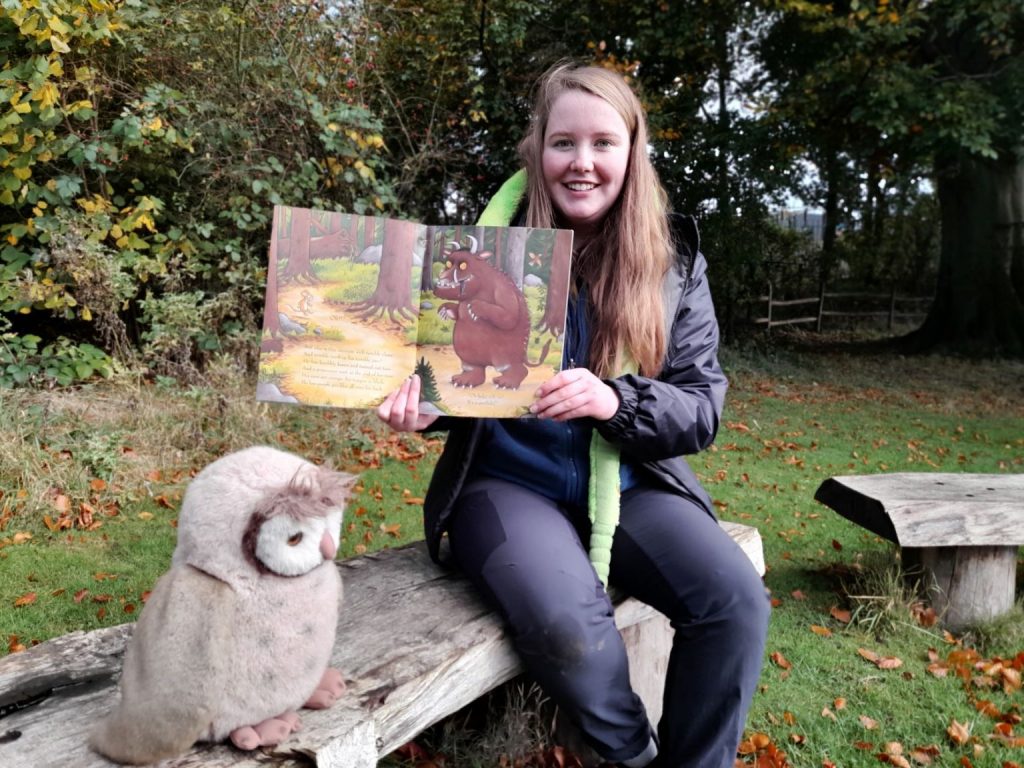
With half term behind us, we got straight back into teaching. We’ve had a week of our ‘Gruffalo’ day with reception children, which is great fun! Each of the activities links with an animal from the book. We go on a walk to collect a feast for the mice; we sequence the story like a very clever fox; we look to see who lives in our log piles (unfortunately no snakes!).
My favourite activity in the day is a game we call ‘Alpha Owl’, which is an adaptation of our game ‘Alpha Wolf’. In Alpha Owl, the children close their eyes and I run and hide. They count to 25 with their grown-ups and then shout ‘TWIT TWOO’. I shout ‘TWIT TWOO’ back and they can then take 25 steps towards me. The games goes on until I’m found – which unfailingly puts a huge grin on all their faces!
Chris Barnard, TCV Leeds
Chris also joined TCV Skelton Grange’s children’s activities and describes the kind of fun schools can have at the environment centre.
During October I was involved in teaching Stone Age hunting skills to eight Y2, Y3 and Y4 classes. I achieved this by playing hiding and sneaking games and then taking the children on a hunt to find rabbits, wild boar and mammoths. I’d work with half a class at a time whilst the other half learned camp life skills such as making a clay pot and cooking a mackerel over a fire. This is definitely a fun a day to lead – I’m glad more schools are booking it.
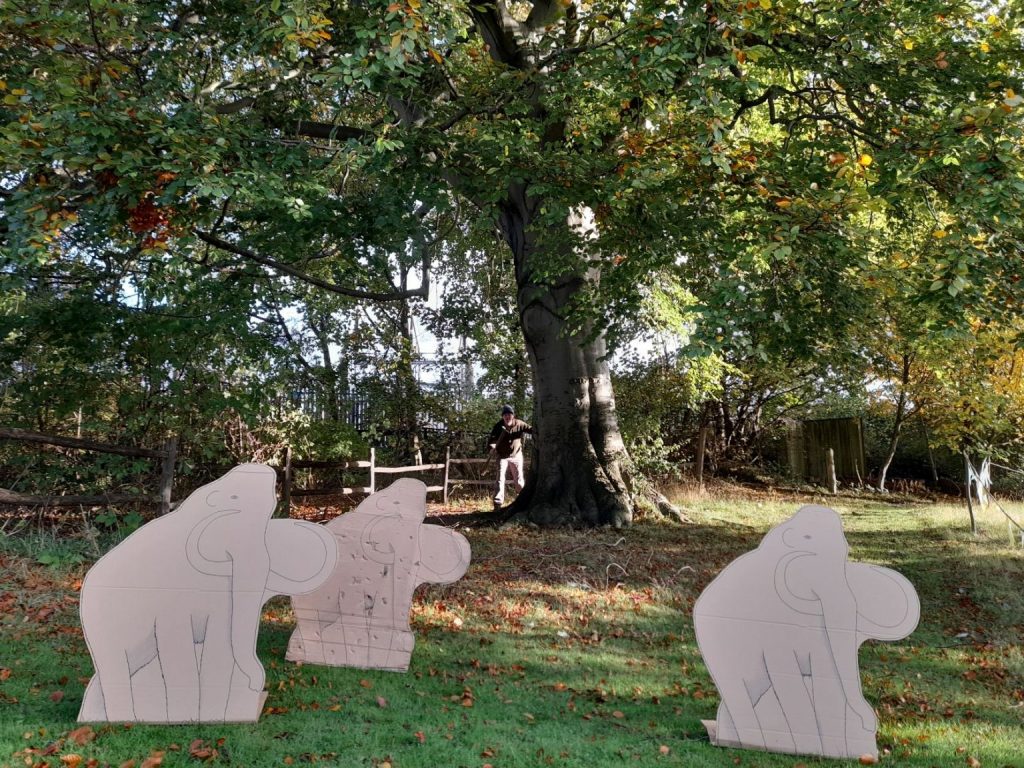
I also taught a day of Habitats, one of our regular education days and another of Wild in the Woods, in which we pretended the children become shipwrecked and have to survive on an island by making shelters, learning to use fire steels, etc. whilst having to avoid the pirates who have returned to the island to recover their buried treasure. This is probably my favourite day that we offer to schools and from the feedback we regularly get I know that the children really enjoy it too. Everything’s better with pirates.
During the half term week I led a session for St. Gemma’s Hospice for 7 – 17 year olds, the highlight of which was a successful group effort to disarm a time bomb by cutting the right colour wire! I also led a Wild Play day during which the children were trying to smuggle a coded message past the Sheriff of Nottingham’s men in Sherwood Forest.
Finally I assisted Becci with two days of Healthy Holidays which Becci had arranged for a group of children from the Hamara Healthy Living Centre. It was a good week with some enthusiastic children, decent temperatures and no rain.
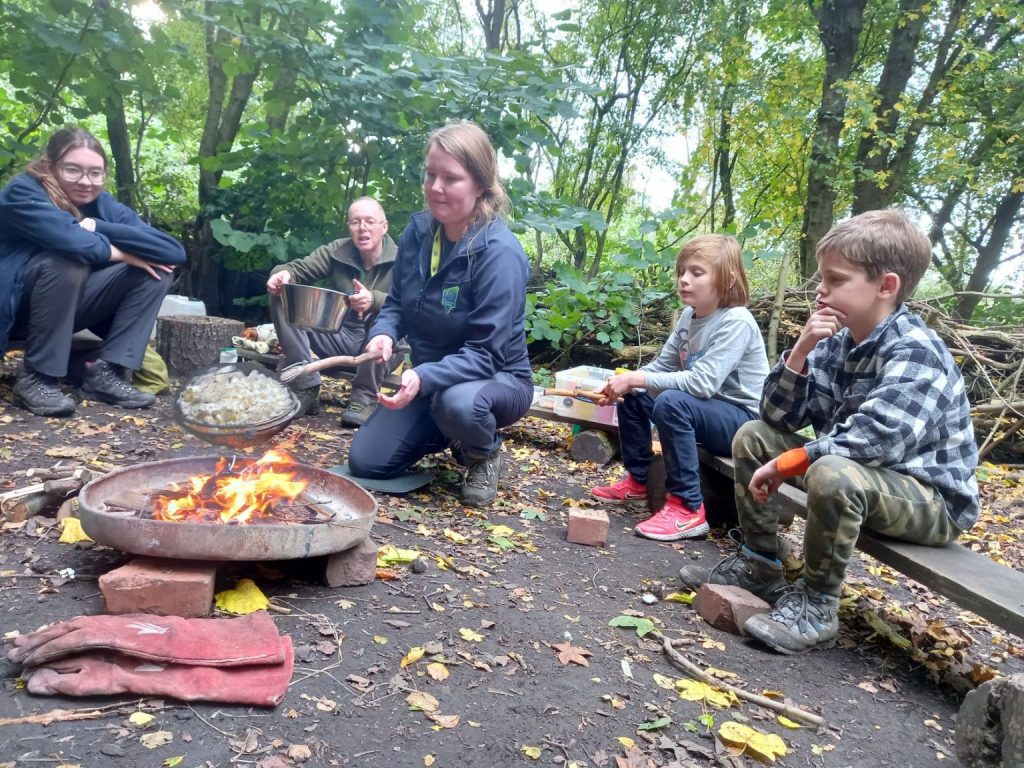
From school children to corporate volunteer days
I also had one day of leading a group of adults from corporate partner Sky on a corporate volunteering day. We were tasked with redefining the edge of the shelter building area with logs, which I’ve been pestering the site team about for months, so they gave me the job! It was pleasant to work with adults for a change and to see the improvements I’d been thinking about for a while.
Eva Freegard, TCV York
Finally, Eva provides a bumper blog, updating us on tasks she’s been involved in since the summer along with some really interesting insights into balsam, bracken bashing, and meadow management.
Citizen Science
In September, I was able to help at TCV’s Skelton Grange Open Day (a big event in their calendar). This is a great opportunity to engage with children and their parents with many different exciting activities going on all day. Myself and Becci decided to run a citizen science stall to contribute to the day. As we both have background in entomology, a minibeast hunt was perfect!
We planned a two minute minibeast hunt, where participants counted everything they could see underneath a log within the time limit. It was great to see so many enthusiastic people get involved. It was also a great opportunity to discuss the importance of invertebrates and the severe biodiversity declines they are currently experiencing. We were able to give advice on how to make your garden more invertebrate friendly, and measures we can take to help curb further losses.
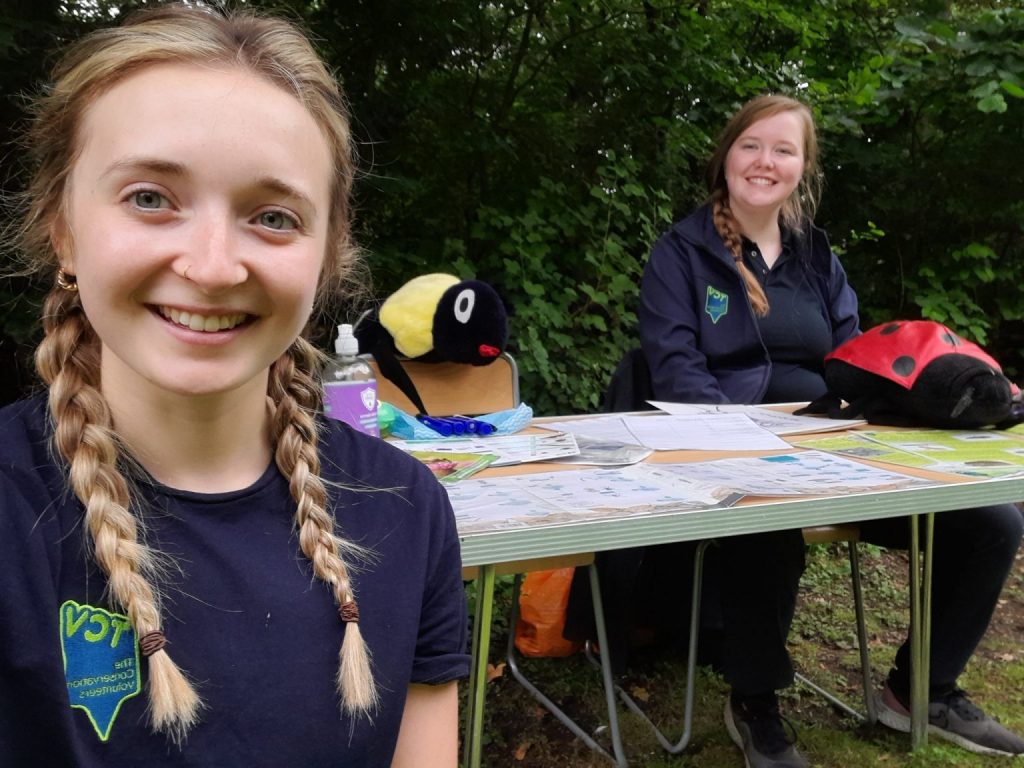
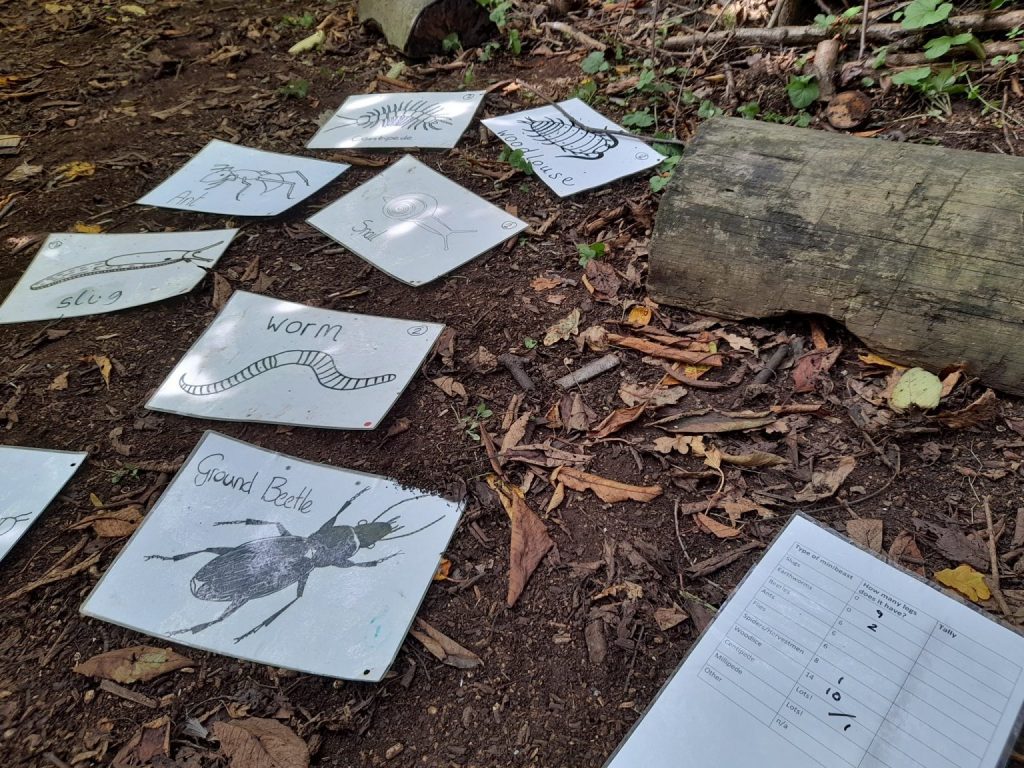
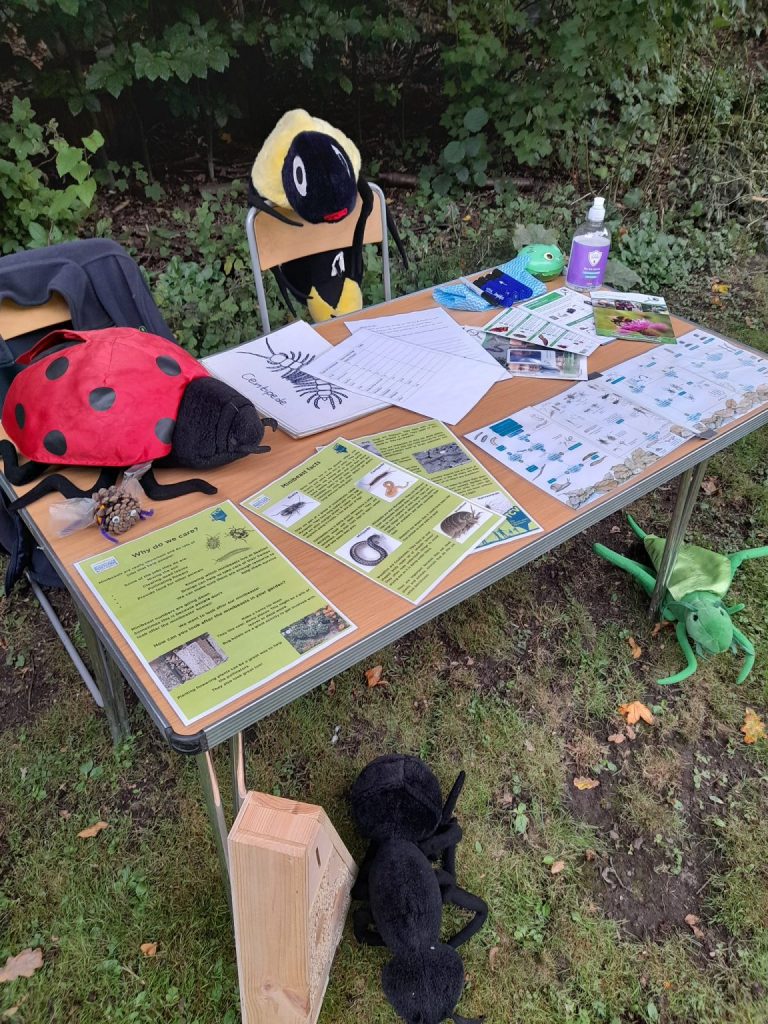
Revisiting Reed Planting
In the summer, we spent some time helping the Yorkshire Wildlife Trust at North Cave Wetlands Nature Reserve. The reserve was originally developed on a sand and gravel quarry and is now a haven for wildlife, even attracting rare birds like spoonbills and bitterns. It also supports a huge range of other species including many insects such as butterflies, moths and dragonflies. I managed to snap some pictures of a small skipper, a ringlet, some cinnabar moth caterpillars and some waisted bee-grabber flies whilst walking around the site.
The reserve is in the process of undergoing a huge extension onto the neighbouring quarry, which would extend the wetland habitat significantly. To facilitate the extension, we have been helping the trust develop a reed bed nursery. By planting these reeds, it will allow them to grow and be transplanted to create the new habitat. Extending the habitat further will support even more plants and animals, increasing the diversity and abundance of species at the site.
It was great to get to work on a nature reserve and speak to the reserve managers about their visions and plans for developing the site even more. I look forward to revisiting it in the future to see how our hard work has contributed to improving the reserve.
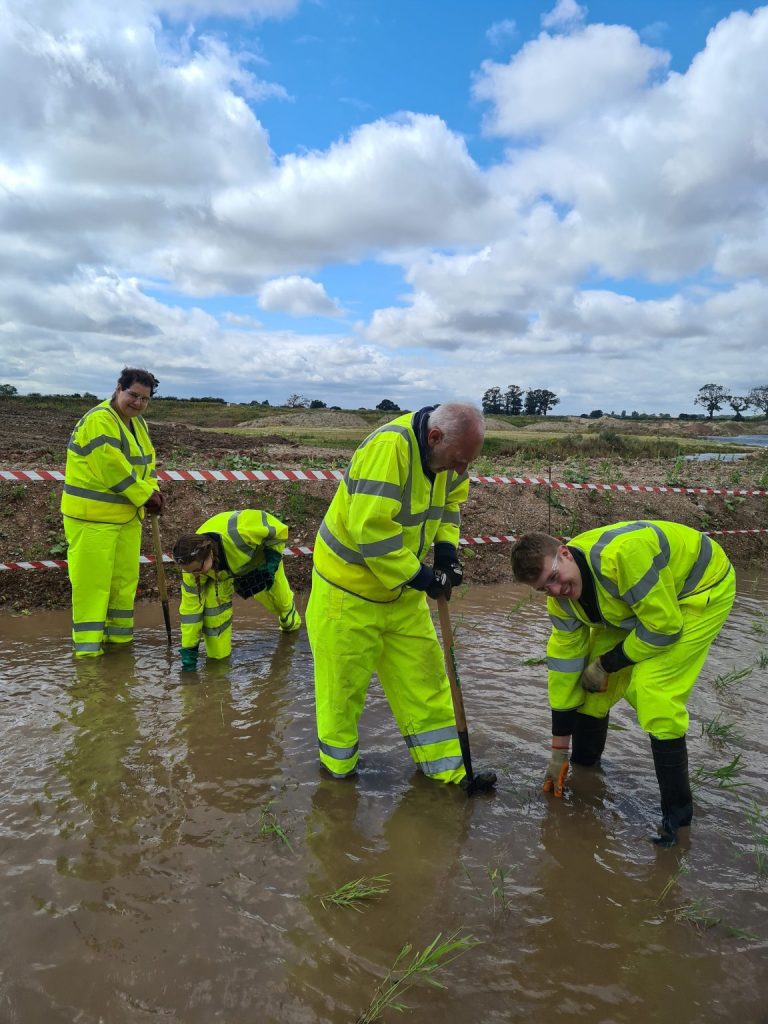
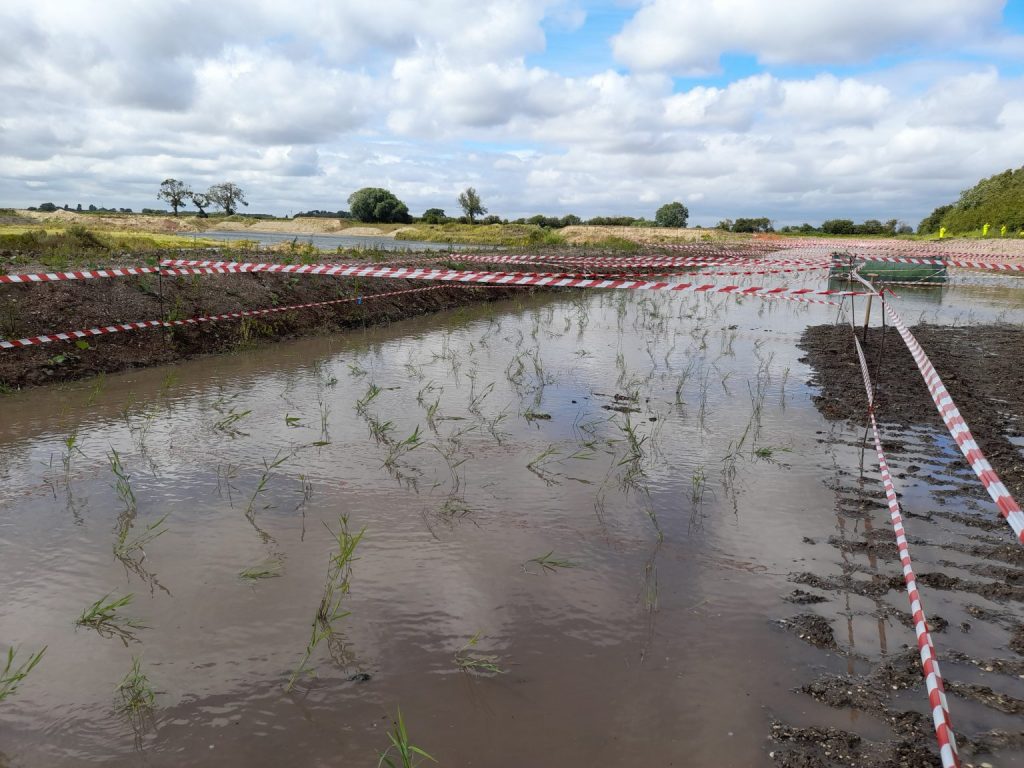
Event Experience
I had a break from getting muddy one morning by getting to represent TCV at an NCS event. This involved explaining what TCV does and why we are needed to the young people enrolled in the NCS programme. It was great to discuss what benefits the work TCV provides for not only the environment, but for bringing communities together and promoting healthier lifestyles – both mentally and physically.
Engaging younger individuals in important environmental issues is something I really enjoy, and it was excellent to hear so many of them are aware of climate and biodiversity crises. Many people had not come across the charity before and seemed very keen to get involved and do something to help the environment.
The aim of the session was to help spark ideas or interests which could be used in developing a community project. Examples of ideas included fund raising to help deliver an environmental project, helping do conservation work by volunteering with us or developing promotional material to spread the word about TCV and recruit more volunteers.
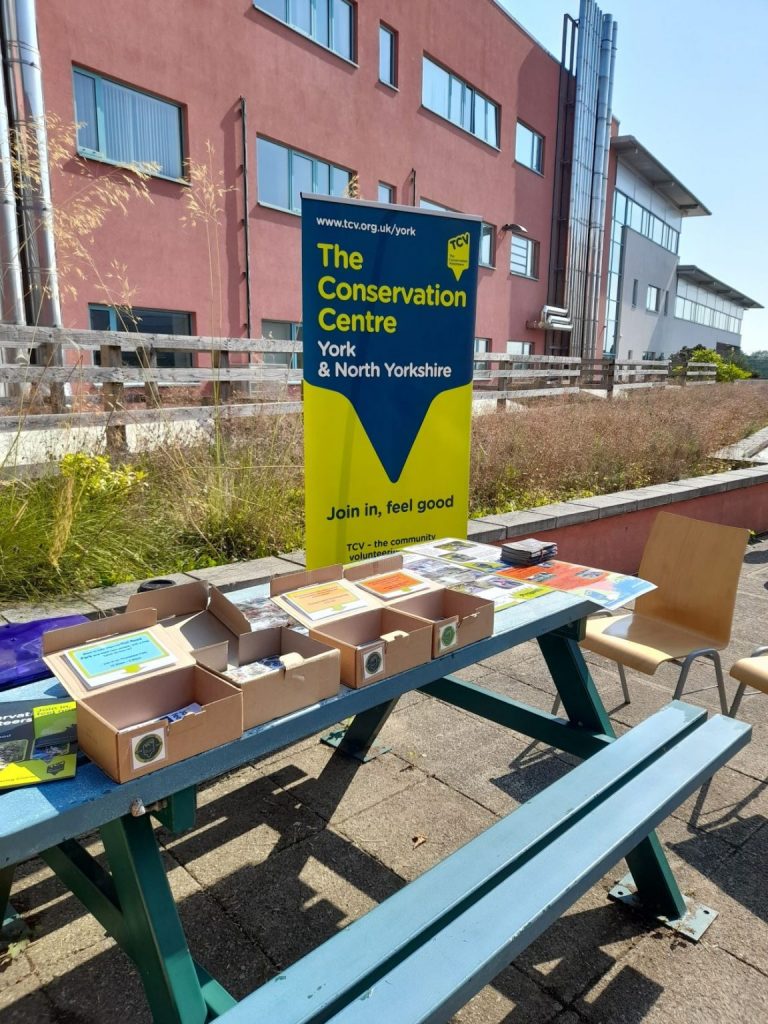
Meadow Management
Meadows are a very important habitat in the UK, supporting a huge variety of species including wildflowers, insects, amphibians, mammals and birds. Unfortunately, now only 2% of meadows that existed in the 1930’s still remain, threatening the biodiversity that relies upon them. Not only are meadows crucial for promoting species richness but are also involved in delivering ecosystem services such as carbon storage, water retention and pollination.
To properly care for species-rich grasslands, certain management must be undertaken every year. TCV York is responsible for doing this on many of the meadows in York and the surrounding areas. During the summer months, we spend lots of time cutting the vegetation after most of the flowers have died off. It is then crucial that we rake up and remove all of these cuttings to allow diverse regrowth. Many wildflowers will only grow in low-nutrient soil so if we didn’t take the time to remove it we wouldn’t see the same variety of vegetation as the soil would become too fertile.
Here are some photos of our meadow management in Hessay Churchyard from the summer. After lots of cutting with the strimmers and the power scythe, it was a big team effort to collect up all of the grass cuttings (there were certainly a lot of them!). I now have my brush cutters license too. Quite the transformation, don’t you think?
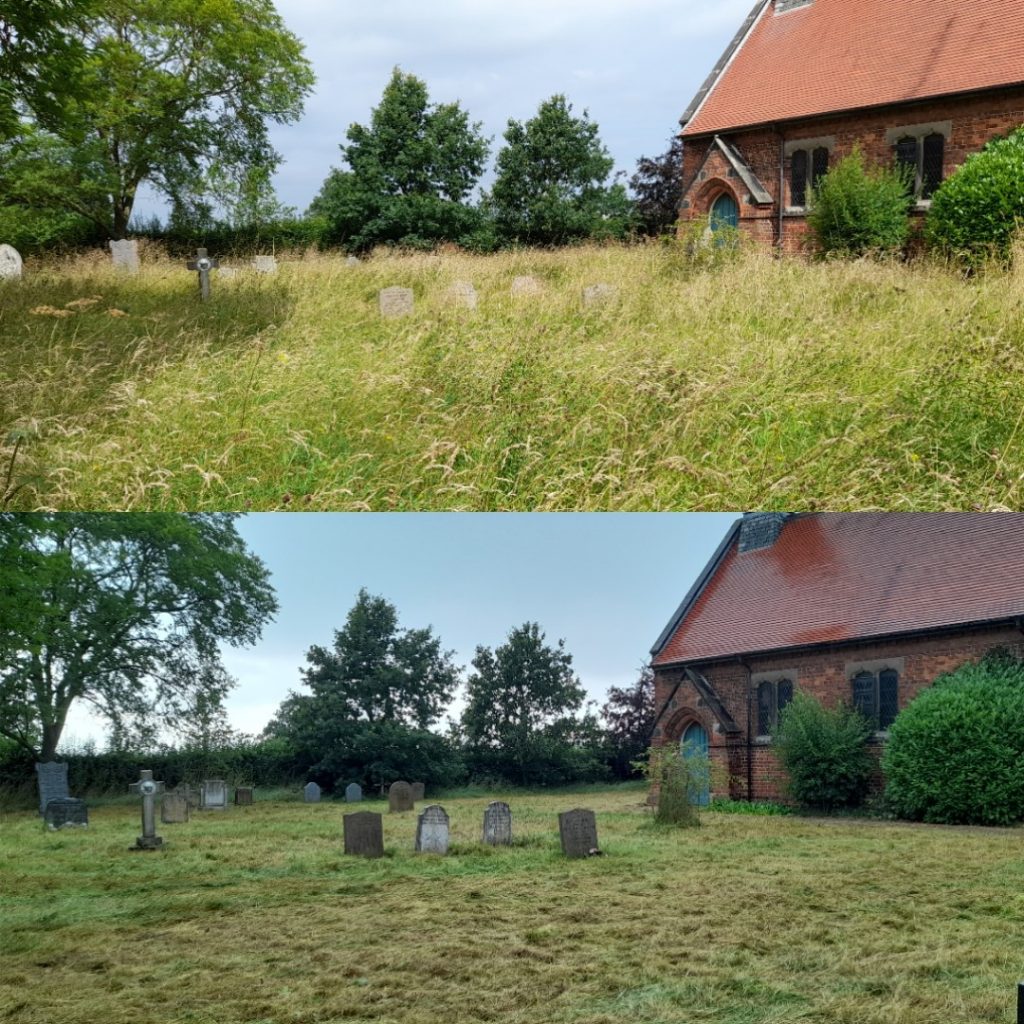

Bracken Bashing
Although part of an important habitat, bracken can become a problem if it is not controlled as it can completely dominate landscapes and outcompete many other plants. To combat this, we have been up at Roman Plantation in the Howardian Hills AONB ‘bashing’ the vegetation back to reduce its vigour and create more of a habitat mosaic. Having some areas of thick bracken and other areas where it is regularly controlled, the level of diversity increases meaning more habitat niches are likely to be represented.
By using wooden boards to crush the stems of the plants, the rhizome releases sap, which weakens the vegetation. This means that the following year the growth will be reduced, allowing other floral growth, which will support a range of wildlife. It was very satisfying work hearing the crunch of the bracken stems and we were blessed with some wonderful sunny weather to match the beautiful scenery. I even got to see a tawny owl hiding in the woodland, which was a bit of a treat!
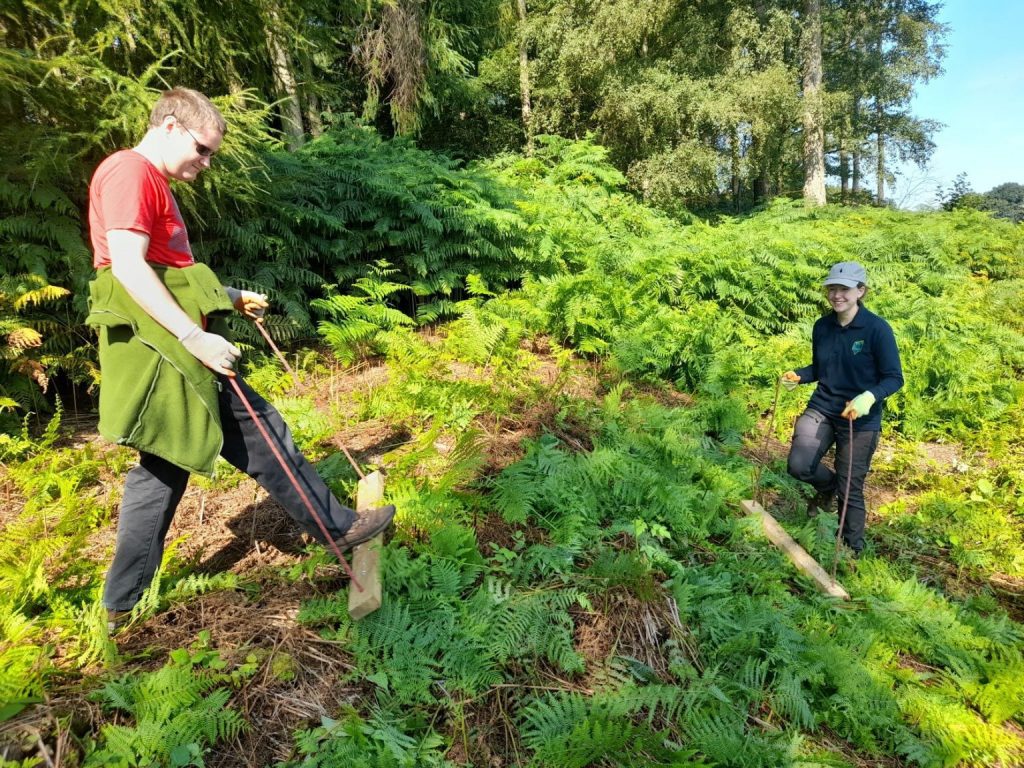
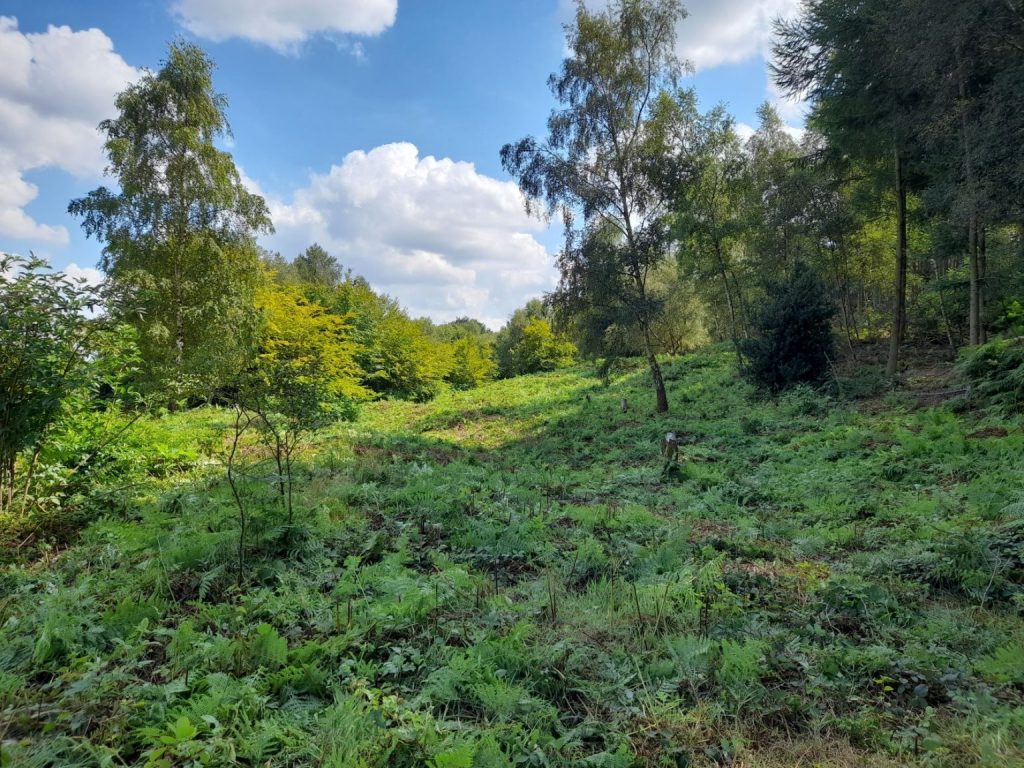
Balsam season
Himalayan Balsam (Impatiens glandulifera) is an Invasive Non-Native Species (INNS) that is incredibly problematic across the UK. Introduced in the Victorian era, the plant is now widespread throughout the country, often found around watercourses. It spreads very easily, producing large volumes of seed that are largely distributed by humans or by water.
It is especially problematic because its fast growth and dispersal mean that it often outcompetes native plants and reduces biodiversity. This can have a knock-on impact for other species such as insects and birds, as without the plants they rely upon, many species cannot survive. It also contributes to soil erosion along waterways once the plants have died back, which can increase siltation causing further problems.
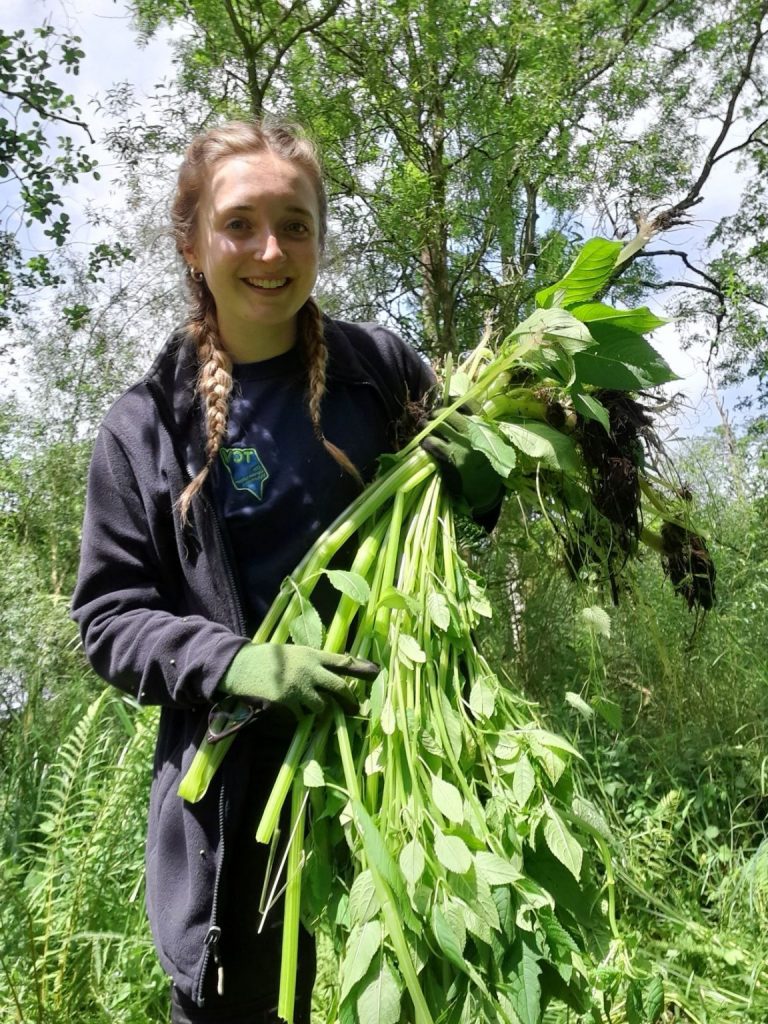
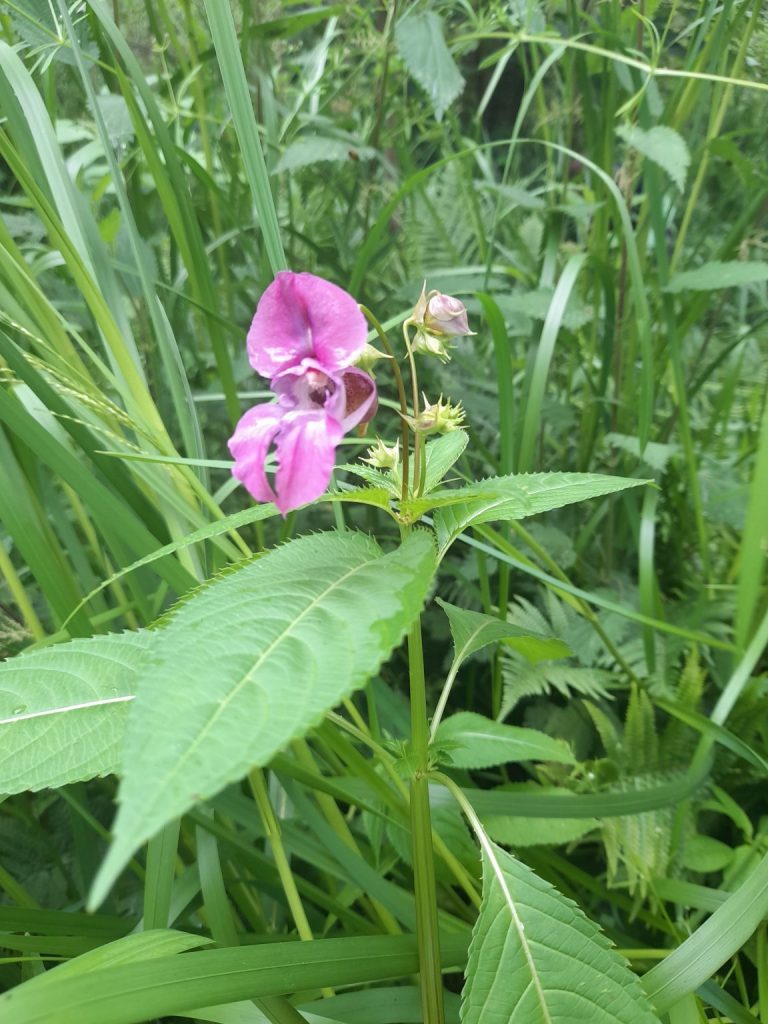
Timing is very important when it comes to controlling Balsam. Once the seed pods are visible you may start doing more harm than good interfering with them without covering the top of the plant, which would be very time consuming. By removing the plants before the seed pods develop, the risk of seed dispersal is much lower. The seed can remain viable for up to 2 years so repeated Balsam control can be a very effective method of reducing the negative impact it has.
Every year, the TCV York office does lots of work to control and manage Balsam throughout the region. This is largely done through a combination of strimming and hand-pulling. Both removal methods can be very effective as long as the plant is cut or broken before the lowest node to prevent regrowth. For large areas where Balsam is very dense and dominating, cutting is a much faster method of control, but where it is growing within other vegetation hand pulling can be a much less destructive option.
It has been great to get more experience in using both of these control methods to fight invasives. So far, with the help of our amazing volunteers we have removed a significant amount of Balsam from many sites.
Thanks goes to players of People’s Postcode Lottery for your support. To read previous installments of the WildSkills blog and the impact funding is having, click here.

